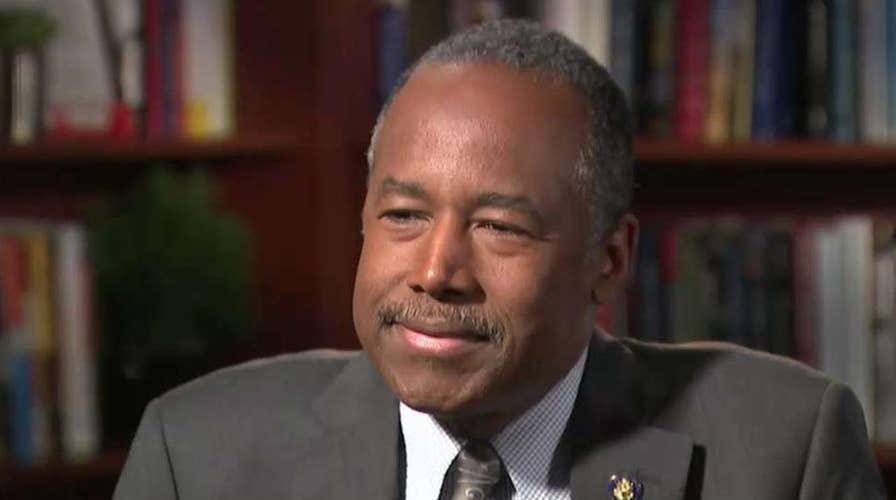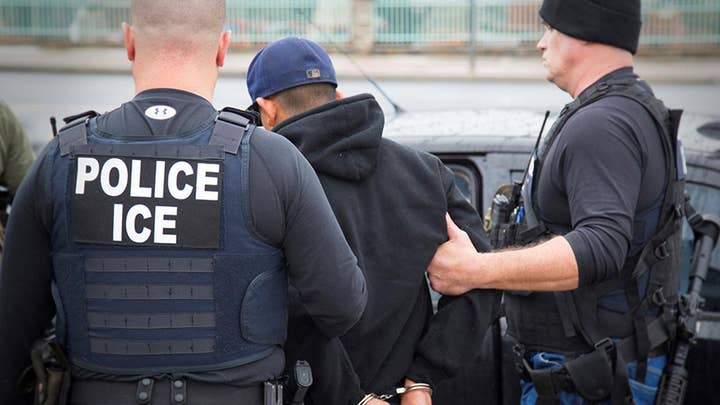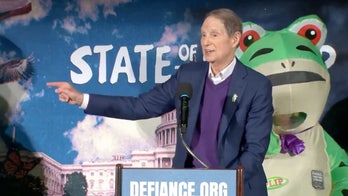Secretary Ben Carson on Trump administration efforts to boost economic development in distressed areas
Department of Housing and Urban Development introduces new 'opportunity zones' program.
The Trump administration on Friday moved forward with a proposed rule to make it harder for illegal immigrants to access federally subsidized housing -- the latest crackdown by the administration on immigrants who use public assistance.
The rule, proposed by the Department of Housing and Urban Development (HUD) and posted in the Federal Register, would require that those seeking public housing would be subject to verification of their immigration status. Only families in which every member is either a citizen or a legal resident would qualify for federally subsidized housing. Currently families where at least one person is either a citizen or green card holder can get federal assistance, even if other family members are not.
BIDEN BACKS HEALTH CARE FOR ILLEGAL IMMIGRANTS, SAYS 'WE HAVE AN OBLIGATION' TO PROVIDE IT
The administration says that regulations “presently excuse individuals from submitting documentation if they do not contend to having eligible immigration status. This results in no actual determination of immigration status being made.” The rule would also require current participants who have not previously proven their eligibility to do so at their next evaluation of their need for public assistance.
An agency analysis, reported by The Washington Post, found that approximately 25,000 households, representing about 108,000 people, now live in subsidized housing with at least one person who would be ineligible.
Among those “mixed-status” households, 70 percent are legally eligible for benefits -- approximately 76,000 people including 55,000 children. The majority live in California, Texas and New York, the Post reported.
“HUD expects that fear of the family being separated would lead to prompt evacuation by most mixed households,” the agency’s analysis said. “Temporary homelessness could arise for a household, if they are unable to find alternative housing.”
BORDER PATROL APPREHENDS 'LARGEST GROUP' OF ILLEGAL IMMIGRANTS NEAR US BORDER YET
HUD Secretary Ben Carson defended the proposal this week, telling Fox Business’ Stuart Varney that illegal immigrants are limiting assistance that could go to “legitimate American citizens.”
“We have a long list of people we can only serve right now one in four of the people who are looking for assistance from the government," he said. “So obviously we want to get those people taken care of. And we also want to abide by the laws.”
An administration official told The Daily Caller, which first reported the proposal last month, that "we need to take care of our citizens."
“Because of past loopholes in HUD guidance, illegal aliens were able to live in free public housing desperately needed by so many of our own citizens. As illegal aliens attempt to swarm our borders, we’re sending the message that you can’t live off of American welfare on the taxpayers’ dime," the official said.
However, the HUD analysis reportedly found that that the rule could cost up to an additional $227 million a year because mixed-status families would then receive higher subsidies.
The proposal is likely to face fierce opposition from Democrats. On Friday, 13 Democratic members of Congress from New York said in a letter to Carson that it would “needlessly inflict hardship” on families.
“Your approach represents a major shift from current HUD policy and by design makes it more difficult for families to have access to assistance for which they would otherwise be eligible," the letter says.
CLICK HERE TO GET THE FOX NEWS APP
It is the latest proposed crackdown by the administration on the use of public assistance by immigrants. Reuters reported last week that the administration is considering making it easier to deport legal permanent residents who have used public benefits.
A draft regulation, which is still subject to change, would reportedly allow for the deportation of some permanent residents who have used certain public benefits within five years of admission into the U.S. Those benefits include Supplemental Security Income (SSI), the Supplemental Nutritional Assistance Program (SNAP), Section 8 housing vouchers, certain Medicaid benefits; and Temporary Assistance for Needy Families (TANF).
The Associated Press contributed to this report.














































